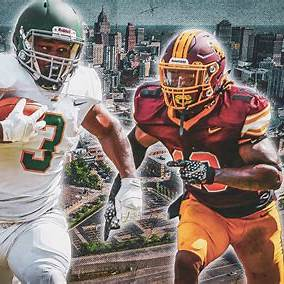HBCU Classics: More Than a Game — It’s Legacy in Motion
- The Chronicle News

- 3 days ago
- 3 min read

When the band takes the field, the game becomes a ceremony—marching to the rhythm of history, pride, and community.” Photo: Chronicle Media Group Illustration / Generated Image
There’s a moment each fall when stadium lights flicker on, marching bands ignite, and generations converge, this is HBCU Classic season, a time when Black college football isn’t just a game; it’s a celebration of heritage, perseverance, and pride.
From Baton Rouge to Birmingham, from New York to New Orleans, Classics power more than scoreboards. They fuel economies, gather alumni, and center culture in every drive, beat, and halftime show. The battles on the gridiron echo stories of struggle and triumph, and the sounds of brass and drums remind us that these matchups are cultural ceremonies as much as athletic contests.
Detroit Joins the Legacy
This year, Detroit rejoined that tradition in spectacular fashion. The Detroit Football Classic returned to Ford Field for the first time in nearly two decades, bringing HBCU football back to Michigan’s largest city. On August 30, Kentucky State rallied to defeat Central State University in a game that energized both alumni and newcomers.

For The Chronicle, the moment hit close to home. Our own intern Nassan, a proud Central State student, watched as his Marauders took the field under the bright lights of Ford Field. His experience reflects what these Classics mean: they’re not just contests between schools, they’re gatherings of history, pride, and legacy that stretch from campus quads to city blocks.
Detroit’s embrace of the Classic proves that the heartbeat of HBCU football isn’t confined to the South. It thrives wherever alumni, students, and supporters come together to celebrate. In Michigan, the return of the Classic symbolizes resilience, revival, and the power of community to keep traditions alive.
The Heartbeat of the Classics: Marching Bands
While the scoreboard tells one story, the marching bands tell another—a louder, prouder one. At every HBCU Classic, the band is as central as the game itself. Fans come early not just for tailgates but for the Battle of the Bands, the halftime theatrics, the dance lines, and the thunderous sound that makes stadiums vibrate.
More than entertainment, the bands are cultural ambassadors. They carry history in every formation, honor tradition in every cadence, and create spaces of comradery where rivalries dissolve into shared pride. For many fans, the highlight of the day isn’t the touchdown but the tuba line, the drum major’s salute, or the high-step that sparks applause across generations.
At the Detroit Football Classic, just as in Birmingham’s Magic City Classic or New Orleans’ Bayou Classic, the bands didn’t just accompany the game—they were the game. They are proof that HBCU Classics are about community as much as competition, rhythm as much as rivalry.
The Season Ahead
The Detroit matchup was just the kickoff. Here are some of the 2025 HBCU Classics still to come:
Sept 6 – Louis Crews Classic: Alcorn State @ Alabama A&M (Huntsville, AL)
Sept 13 – HBCU NY Football Classic: Morehouse vs. Howard (MetLife Stadium, NJ)
Sept 27 – Southern Heritage Classic: UAPB vs. Alcorn State (Memphis, TN)
Sept 27 – Boombox Classic: Jackson State @ Southern (Baton Rouge, LA)
Sept 27 – State Fair Classic: Grambling State vs. Prairie View A&M (Dallas, TX)
Oct 4 – Gulf Coast Challenge: Alabama A&M vs. Jackson State (Mobile, AL)
Oct 25 – Magic City Classic: Alabama A&M vs. Alabama State (Birmingham, AL)
Nov 22 – Florida Classic: FAMU vs. Bethune-Cookman (Orlando, FL)
Nov 29 – Bayou Classic: Southern vs. Grambling (New Orleans, LA)
Why It Matters
These Classics are more than football games. They’re family reunions, block parties, scholarship drives, cultural showcases, and historical reminders. They prove that Black excellence is not a sidebar—it’s the headline.
And now, with Detroit stepping back into the Classic tradition, Michigan has joined the chorus of cities where HBCU legacy thrives. From the rhythm of the marching bands to the resilience of the players, each Classic is testimony: our history is on the field, our culture is in the stands, and our future is rising with every kickoff.














Comments